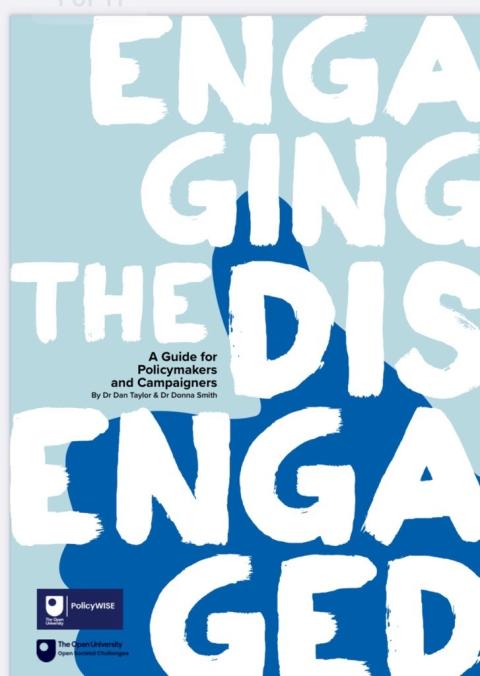NEW toolkit: Engaging the Disengaged: A guide for policymaker and campaigners

Democratic disengagement in the UK is deepening, particularly among young people, minority ethnic groups, unpaid carers, people with disabilities that limit their daily activities, and economically disadvantaged groups. This brief, based on the PolicyWISE toolkit Engaging the Disengaged: a Guide for Policymakers and Campaigners, summarises the roots of this disengagement and offers practical strategies for policymakers to rebuild trust and participation.
Key points:
- Voter turnout and political party membership are low.
- Disengagement stems from feelings of distrust, exclusion, and lack of representation.
- Policymakers must adopt a more inclusive, responsive, and community-centred approach.
Recommendations:
- Meet people where they are: engage in community spaces, not just formal institutions.
- Build trust through transparency and accountability.
- Support civic education and political literacy.
- Invest in long-term, community-led engagement strategies.
- Recognise and value informal political expression.
This briefing addresses the growing crisis of democratic disengagement in the UK. Drawing on the findings of Open University research projects, it provides insights and recommendations for policymakers and campaigners seeking to reconnect with communities that feel excluded from political life.
The UK is witnessing a troubling decline in political participation. Voter turnout in some constituencies has dropped below 50%, and political party membership is at an all-time low. Disengagement is particularly acute among minority ethnic groups, unpaid carers, people with disabilities that limit their daily activities, and economically disadvantaged groups. These groups often feel that politics does not represent or respond to their needs.
The brief argues that by rethinking how and where engagement happens, and by building trust through transparency and accountability, we can begin to reverse the tide of disengagement and strengthen democratic resilience.
Methodology
This brief is based on the PolicyWISE toolkit Engaging the Disengaged, which synthesises findings from community engagement research projects across England and Wales. The research draws on qualitative interviews, surveys, participatory workshops, and case studies involving marginalised groups. It identifies key barriers to democratic engagement and highlights successful strategies for fostering engagement. The report was co-authored by Dr. Donna Smith and Dr. Dan Taylor, with support from PolicyWISE.
Results and conclusions
The report identifies a complex web of factors contributing to political disengagement. These include:
- Lack of trust in political institutions and representatives.
- Perceived irrelevance of politics to everyday life.
- Structural barriers, such as poverty, time constraints, and lack of access to information.
- Cultural and generational divides, where traditional political formats feel alienating or inaccessible.
Disengagement is not apathy. Many individuals are politically active in informal ways—through protests, community organising, online activism, and cultural expression. However, these forms of engagement are often overlooked or undervalued by formal political systems.
The report introduces the concept of “Triangles of Trust”, which outlines three essential components of effective engagement:
1. Transparency: clear, accessible information and open processes.
2. Accountability: decision-makers must listen, act, and report back.
3. Collaboration: a partnership of equals between communities, representatives and statutory bodies, focused on listening and building common ground to get stuff done.
Case studies illustrate how local initiatives—such as youth-led forums, community assemblies, and arts-based activism—can successfully re-engage marginalised groups. These examples show that when people feel heard and respected, they are more likely to participate in democratic processes.
The report concludes that engagement must be redefined. Policymakers must shift from a transactional model of engagement to a relational one—built on trust, dialogue, and shared purpose.
Implications and recommendations
To address democratic disengagement, policymakers must adopt a more inclusive, responsive, and community-centred approach. The following recommendations are grounded in the findings of the toolkit:
1. Redefine political engagement
- Recognise informal and cultural forms of political expression as legitimate.
- Support grassroots activism, community organising, and creative civic participation.
2. Invest in civic education
- Embed political literacy in school curricula and adult education.
- Fund community-based workshops that demystify political processes and empower citizens.
3. Meet people where they are
- Hold consultations and events in community centres, libraries, and public spaces.
- Use online platforms to reach younger and digitally engaged audiences.
4. Build trust through transparency
- Ensure decision-making processes are open, inclusive, and well-communicated.
- Publish clear outcomes from consultations and explain how public input shaped decisions.
5. Foster accountability
- Encourage elected officials to visit communities, listen actively, and report back.
- Create feedback loops where citizens can track progress on issues they raised.
6. Support long-term engagement
- Move beyond one-off consultations to sustained relationships with communities.
- Fund local organisations that have established trust and networks within marginalised groups.
7. Tailor approaches to specific groups
- Understand the unique barriers faced by marginalised groups.
- Co-design engagement strategies with these communities to ensure relevance and accessibility.
8. Champion inclusive leadership
- Promote diversity in political representation and leadership roles.
- Support pathways for underrepresented groups to enter public service and civic leadership.
By implementing these recommendations, policymakers can begin to rebuild the social contract between citizens and the state. Engagement is not a one-size-fits-all process—it requires empathy, creativity, and a willingness to share power. The future of democracy depends on our ability to listen, adapt, and act together.
To learn more about practical insights for policymakers and campaigners on methods to engage disengaged groups, read the Engaging the Disengaged: a Guide for Policymakers and Campaigners toolkit.
Author Details
Dr. Donna Smith
Senior Lecturer in Politics, The Open University.
Dr. Dan Taylor
Senior Lecturer in Social and Political Thought, The Open University.
